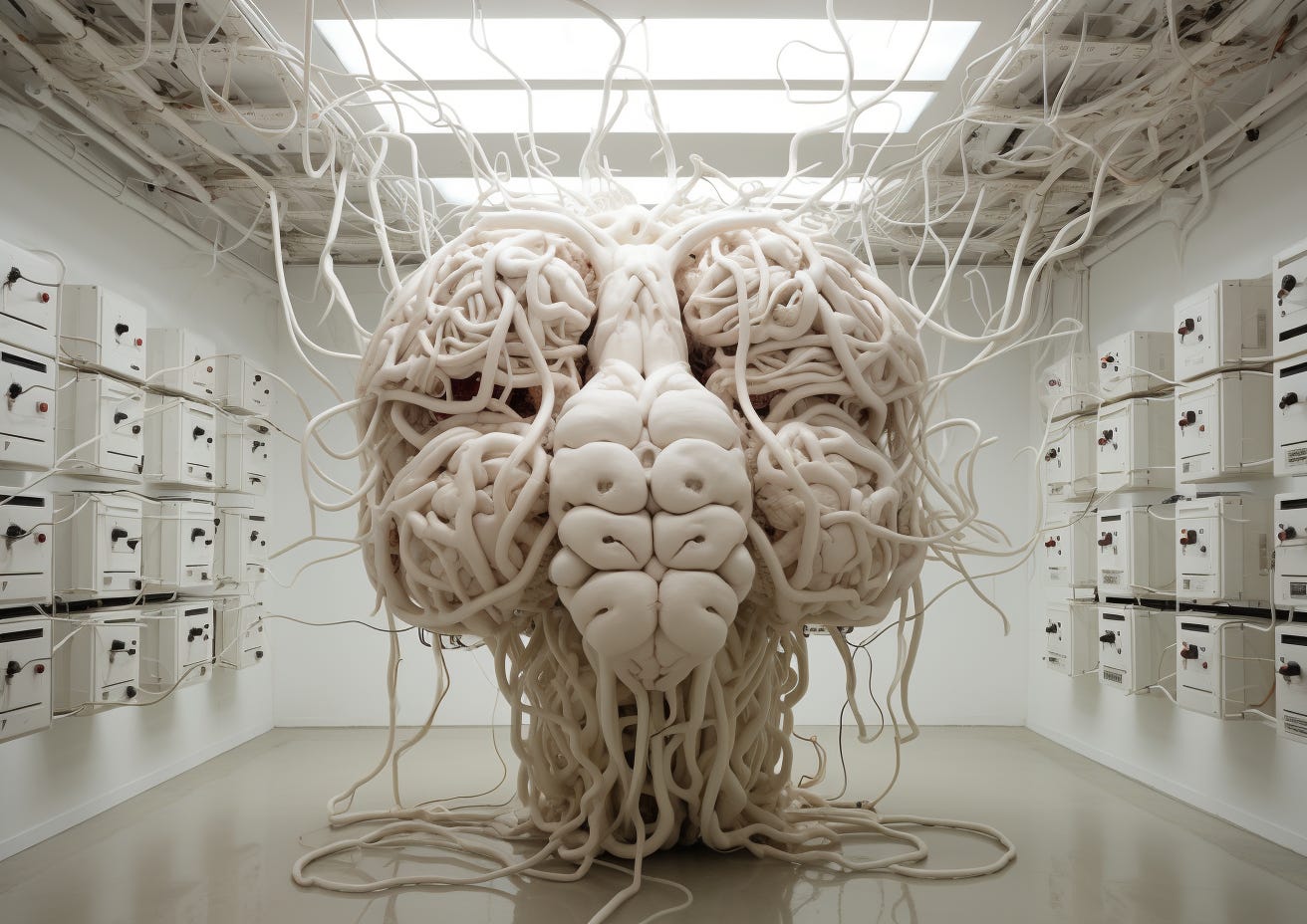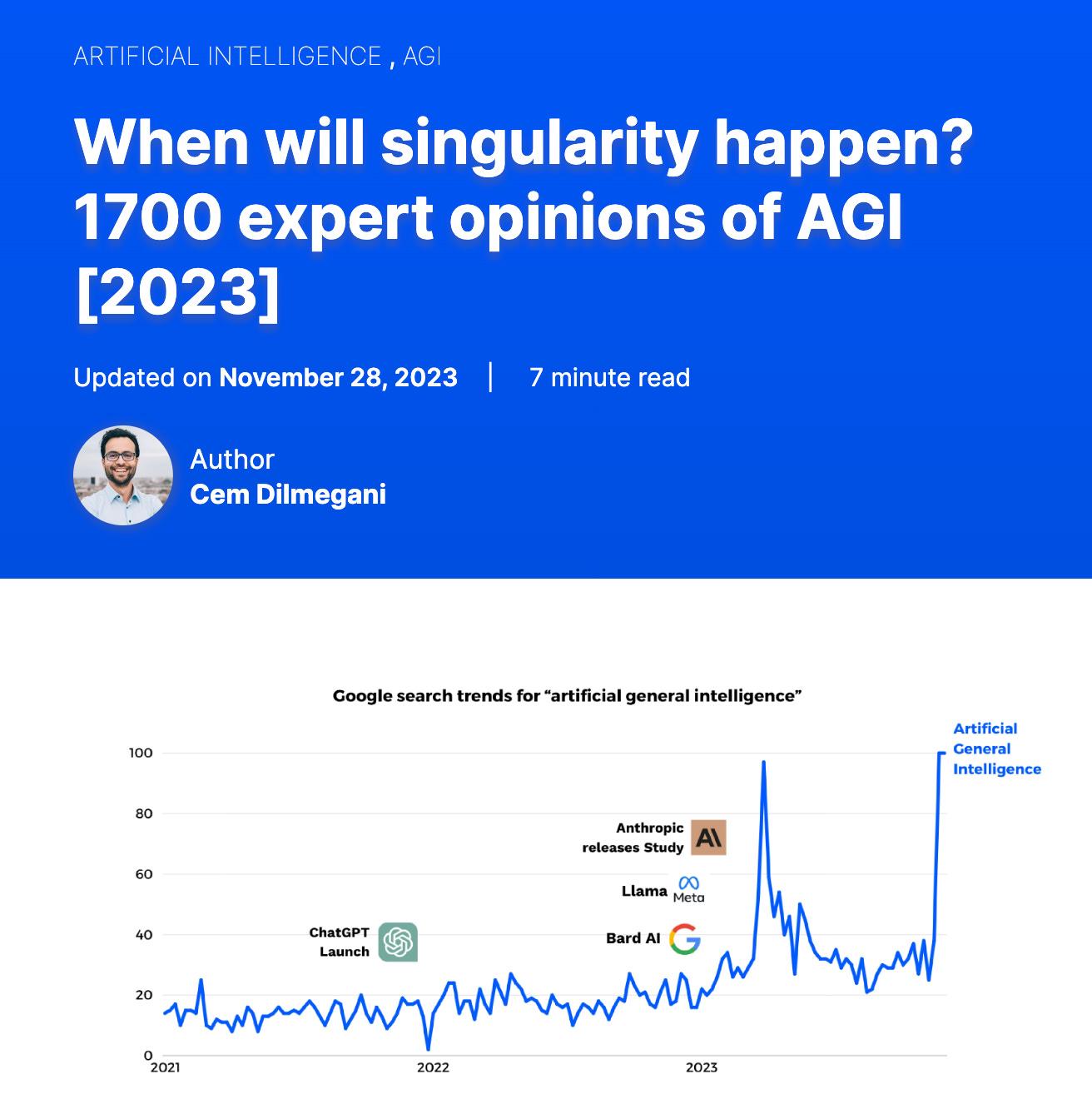Wednesday W.O.W - Artificial General Intelligence 🤖⚡️🧠
[5 min read] Your mid-week bite sized treat on emerging tech on our journey to the Metaverse. Learn about the challenges and possibilities that would be unlocked by AGI and the impact on society

A nibble of knowledge in your inbox every Wednesday with a simple format:
🇼 What the technology is.
🇴 Objective(s) - what is it trying to achieve, with some examples
🇼 Why it is important.
This is week 53 of the 520 weeks of writing I have committed to, a decade of documenting our physical and digital lives converge.
🇼 What is Artificial General Intelligence?
With all the drama over the last few weeks at OpenAI and Sam Altman being fired and then re-hired, the spotlight is more than even on the concept known as Artificial General Intelligence (AGI). Many of the concerns revolve around the idea of AI gaining sentience or entering a mysterious realm termed the "singularity."
Defining AGI requires a nuanced understanding. AGI denotes systems capable of learning and executing any intellectual task on par with or surpassing human capabilities. According to Stanford’s Institute for Human-Centred Artificial Intelligence, AGI encompasses machines with broad intelligence, crucial for tasks like social chatbots or human-robot interactions. Gartner defines AGI as possessing the prowess to understand, learn, and apply knowledge across diverse tasks, incorporating cognitive flexibility and problem-solving skills.
Distinguishing AGI from conventional AI, AGI stands as the advanced sibling. While AI comprises specialised "narrow AI" systems with limited cognitive abilities in certain domains, AGI is a generalist, exhibiting cognitive prowess equal to or exceeding humans. Picture a system adept at planning intricate trips one day and discovering innovative cancer drug combinations the next.
🇴 What are the Objectives?
The objectives of AGI extend beyond mere functionality. These systems are designed to autonomously comprehend, learn, and apply knowledge across an extensive spectrum of tasks. Imagine a future where AGI collaborates with humans, providing unparalleled assistance in planning complex endeavours or unlocking new frontiers in scientific research. However, concerns linger regarding the potential autonomy of superintelligent AGI systems, operating beyond human oversight and setting their own objectives - that would inevitably not be 100% aligned with ours.
When people interact with a tool like GPT-4, it’s easy to be fooled that the boundaries between current AI and AGI are becoming blurred. Once you understand that large language models like ChatGPT are just really good at mashing together unfathomable volumes of data from patterns, it’s clear that there is nothing remotely close to sentience.
While there is lots of noise anticipating AGI's imminent arrival, the general consensus from experts is a 50% chance of AGI by 2059. For example, Time Magazine’s “The 100 Most Influential People in AI 2023” Andrew Ng stress the significant gap between our current capabilities and the smart systems required for true AGI. The definition itself becomes a point of contention, with emotions and expectations influencing perceptions.
🇼 Why is Artificial General Intelligence so important to the future of society?
Of all the topics I have written about, this would have the biggest impact on every aspect of society. Despite the headlines, experts disagree on the timeframe of AGI but regardless it’s worth thinking about.
AGI would mark the onset of a new era in labour economics, propelling humanity towards a cognitive labour revolution. The exponential growth of AI, coupled with quantum computing and automation, would reshape our fundamental relationship with work, money, and businesses. As these technological advancements progress, the landscape of employment will undergo a radical transformation, raising questions about which industries will thrive and which ones will face collapse.
At an individual level, the shift towards post-labour economics presents both challenges and opportunities. With the rise of AI and automation, there would be a surge in cognitive labour and knowledge work. The traditional notion that technology always creates new jobs will challenged, as automation extends beyond manufacturing to encompass knowledge-based professions. The productivity surge resulting from intelligent machines, advanced AI, and language models has far-reaching implications, from scientific research acceleration to the creation of fundamentally new advancements, exemplified by entities like DeepMind.
On an aggregate level, the impact on the economy is profound. Industries heavily reliant on human labour, such as manufacturing, face disruption, potentially leading to massive unemployment. The risk of reduced aggregate demand looms large. As unemployment rates spike, there is will need to address the potential economic stall and the shift towards reduced consumer spending. Will a form of Universal Basic Income be needed? Will technology-driven deflation decrease the cost of living faster than the wages reduce, maintaining purchasing power? These will be key questions.
Industries that are likely to endure in this transformative landscape include those related to primary needs. Sectors dealing with essential resources like food, shelter, clothing, and healthcare are expected to persist, even if fully automated. The demand for sustainable technologies, renewable energy, and automation tools is projected to remain, as these address fundamental human needs.
Additionally, industries catering to rich experiences, creativity, and expression, such as travel, entertainment, and creative pursuits, are anticipated to thrive. The social status economy, emphasising status derived from factors beyond wealth, may become more prominent. Community-focused sectors, including walkable cities, green spaces, and co-housing, are likely to gain importance as people seek connection and shared experiences.
One thing is for sure, if we venture into this uncharted territory of post-labour economics after the rise of AGI, the need for a new social contract becomes apparent. The traditional relationship between the government, corporations, and ordinary people must evolve to ensure fair distribution of wealth and resources, preventing extreme inequality. Will principles of Web3 persist, prioritising equitable access and sovereignty over one’s data and digital assets?
To wrap up, I want to reinforce that this is not all about doom and gloom. The journey into post-labour economics after the rise of AGI is characterised by both challenges and possibilities. Adapting to this new paradigm requires a careful examination of which industries will endure, the emergence of a status economy, and the formulation of a revised social contract to navigate the complexities of a transformed economic landscape.
Bonus
As a bonus read, here is collection of options from actual experts (not just self-proclaimed twitter experts):
That’s all for this week! If you have any organisations in mind that could benefit from learning about emerging technology, be sure to reach out. Educational workshops are one of many consulting services I offer.

